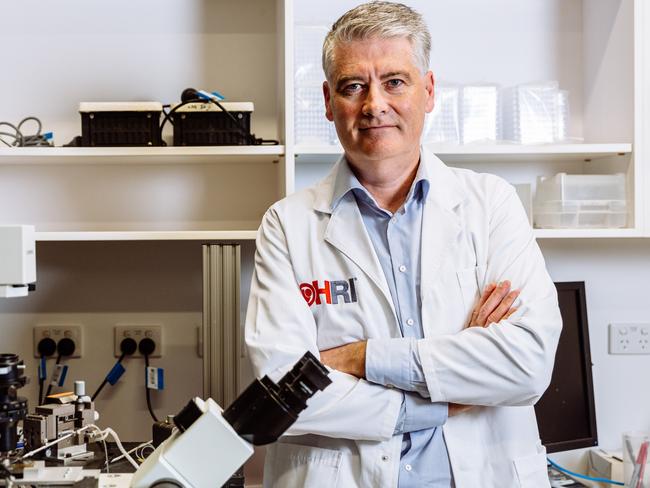Royal Melbourne Hospital among six hospitals to offer patients clot-busting medication in world-first trial
It may be the biggest drug breakthrough for strokes in decades, and its world-first trial will include patients at a Melbourne hospital.
Victoria
Don't miss out on the headlines from Victoria. Followed categories will be added to My News.
A clot-busting medication researchers hope will be the first stroke “drug breakthrough” in more than 30 years will be given to Australians as early as next month in a world-first trial.
The “homegrown” Aussie drug, developed by scientists at the Heart Research Institute, can be traced back to a Box Hill Hospital discovery in the 90s.
Six hospitals – including the Royal Melbourne – will begin offering the drug to patients in the coming weeks, in combination with the existing treatment they would have received.
The trial received a $2.7m federal grant in 2021 but was delayed after Russia invaded Ukraine – home to materials needed to make the drug.
Sixteen million people, including 27,000 Australians, suffer strokes every year and treatment is both time-sensitive and limited – with just two options available.
HRI thrombosis group lead researcher Professor Shaun Jackson said their unique blood-thinning drug was unlike anything else available and, if successful, “will be the first drug breakthrough for the treatment of stroke in more than three decades of research”.
“What we’re trying to do is dissolve the blood clot that is stopping blood flow to the brain [without risking a bleed],” he said.

“People have been trying to do that for 40 years and really struggled to do that effectively and safely.”
Royal Melbourne Hospital neurologist Professor Geoffrey Donnan consulted on the trial and said, while it was very early days, the drug was “very promising”.
“It’s a completely new approach to the clotting,” he said.
Prof Jackson said clinicians’ current options to treat ischaemic strokes were to remove the clot via surgery and one drug, tPA, that works for one in 10 patients.
“tPA … is just not very effective in stroke, so we’re trying to improve its ability,” he said.
“If this drug can improve blood flow to the brain, without causing excessive bleeding, it could be a game changer.”
Animal studies showed the new TBO-309 drug boosted tPA’s function, improving blood flow to the brain and therefore reducing injury.
HRI Associate Professor Simone Schoenwaelder said this discovery was a “eureka moment”.
“It not only helps dissolve the stroke-causing blood clot more effectively, but it can stop the clot from reforming altogether by targeting different and complementary components of the blood clot,” she said. She said the drug’s benefit was its “unprecedented safety profile”, as unlike other blood-thinning drugs, it does not carry the “potentially devastating risk” of bleeding.
The 80 patients in the phase II trial – called STARS – will be the first human stroke patients to receive the drug in the world.
Prof Jackson hopes their drug could reduce disabilities caused by stroke and said – if successful – it could one day be prescribed on its own.
“In stroke, time is brain,” he said. “The longer it takes you to get treatment, the worse off you will be. Advanced stroke care is only available in major hospitals. We think this drug can help balance the gap between rural and city health.”
More Coverage
Originally published as Royal Melbourne Hospital among six hospitals to offer patients clot-busting medication in world-first trial




